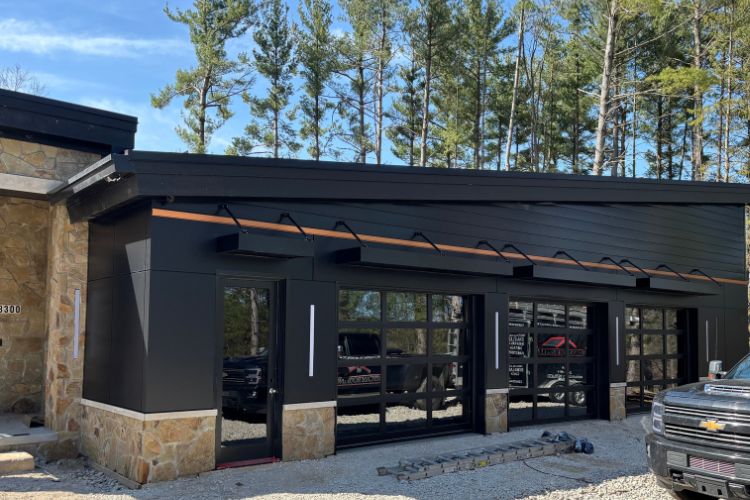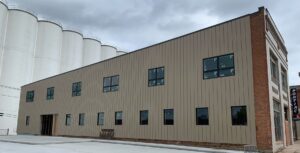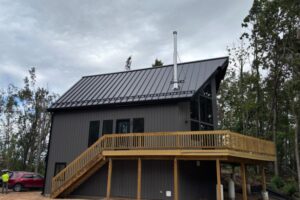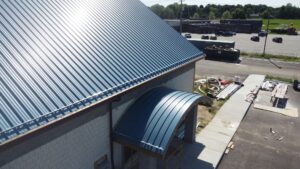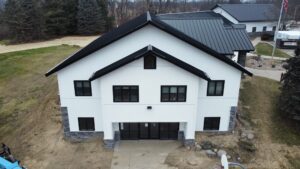How To Choose Metal vs. Composite Siding
When it comes to updating the exterior of your home or commercial property, siding plays a critical role in both appearance and functionality. Not only does siding protect the structure from weather and wear, but it also enhances curb appeal, increases property value, and reduces maintenance demands. Among the many siding options available today, metal siding and composite siding have become two of the most popular choices. Each has its own advantages and drawbacks, making the decision highly dependent on your budget, aesthetic preferences, and long-term goals.
In this article, we’ll break down the key differences between metal and composite siding so you can determine which is the best fit for your property.
What Is Metal Siding?
Metal siding is most commonly made from aluminum or steel, though zinc and copper are sometimes used for high-end applications. It’s known for its strength, durability, and ability to withstand extreme weather conditions. Metal siding is available in a variety of finishes, colors, and styles, including panels, corrugated sheets, and even designs that mimic wood.
Key Features of Metal Siding:
- Extremely durable and resistant to rot, pests, and fire
- Available in both modern and traditional designs
- Low maintenance compared to wood siding
- Often recyclable and environmentally friendly
- Can last 40–70 years with proper care
What Is Composite Siding?
Composite siding is made from a mixture of materials such as wood fibers, resin, polymers, and other synthetic components. The goal is to combine the natural beauty of wood with the durability of modern materials. Popular brands often design composite siding to replicate the look of real wood without the downsides like warping, insect damage, or rotting.
Key Features of Composite Siding:
- Designed to look like wood while being more resilient
- Resistant to mold, mildew, and pests
- Available in a wide range of styles and colors
- Requires less maintenance than natural wood siding
- Can last 30–50 years depending on the product and installation quality
Comparing Durability
When choosing siding, durability is often a top priority. Metal siding stands out for its strength and resistance to harsh weather, making it ideal for regions with heavy storms, high winds, or fire risks. Aluminum siding resists rust and corrosion, while steel siding provides excellent impact resistance.
Composite siding is also highly durable, though it doesn’t quite match the extreme longevity of metal. However, it holds up very well against everyday challenges like moisture, termites, and temperature fluctuations. For many homeowners, composite siding provides the perfect balance between strength and style.
Winner: Metal siding (for maximum durability)
Maintenance Requirements
One of the biggest factors in siding choice is how much maintenance it requires. Metal siding is considered low maintenance. It typically needs only occasional washing to remove dirt and debris. Steel siding may need repainting or refinishing over time to prevent scratches from rusting, but overall, it’s easy to care for.
Composite siding requires slightly more attention. While it’s far less demanding than natural wood, it may need periodic repainting or sealing depending on the brand and finish. Still, compared to traditional siding options, composite offers homeowners a relatively hassle-free solution.
Winner: Metal siding (lowest maintenance overall)
Aesthetic Appeal
Appearance is a major factor in siding choice, as it directly impacts curb appeal. Composite siding excels in this category because it’s specifically designed to replicate the warm, natural look of wood. It offers a wide range of textures, styles, and colors, making it versatile enough for both modern and traditional architecture.
Metal siding, while available in various finishes and designs, tends to look more industrial or contemporary. However, manufacturers now offer options that mimic wood grain or use textured finishes to create a softer appearance. For homeowners who want a sleek, modern look, metal siding is often the top choice.
Winner: Composite siding (for natural, wood-like beauty)
Cost Considerations
Cost is another deciding factor for many property owners. Composite siding tends to be less expensive upfront than premium metal siding, but it depends on the material and brand. Aluminum siding is typically affordable, while steel, zinc, and copper can be significantly more costly.
Over time, metal siding’s durability can make it a more cost-effective investment, since it often outlasts composite siding by decades. However, for those on a tighter budget, composite siding offers an attractive, cost-efficient alternative.
Winner: Tie (depends on upfront vs. long-term investment)
Environmental Impact
Sustainability is becoming increasingly important in construction and remodeling. Metal siding is one of the most eco-friendly siding options available because it is fully recyclable. Many products are even made from recycled metal, reducing the demand for new raw materials.
Composite siding is also more eco-friendly than traditional wood because it uses recycled materials and prevents deforestation. However, it is not as easily recyclable at the end of its lifespan compared to metal.
Winner: Metal siding (best recyclability)
Installation Factors
Installation complexity can affect both costs and timeline. Metal siding, especially large steel or aluminum panels, requires professional installation and specialized tools. The panels are heavy and can be challenging to handle without proper training.
Composite siding is generally easier to install, making it a popular choice for residential properties. Many products are designed with interlocking systems that speed up installation and reduce labor costs.
Winner: Composite siding (easier installation)
Which One Is Right for Your Property?
Ultimately, the choice between metal and composite siding comes down to your priorities:
- Choose Metal Siding if:
- You live in an area with harsh weather conditions
- You want a long-term, low-maintenance solution
- You’re aiming for a modern, industrial, or sleek aesthetic
- Sustainability and recyclability are high on your list
- Choose Composite Siding if:
- You love the look of wood but don’t want the upkeep
- You’re working with a tighter budget
- You want a wide variety of styles and design options
- Ease of installation is a priority
Final Thoughts
Both metal and composite siding offer excellent protection, style, and value for property owners. Metal siding is unmatched in durability and sustainability, while composite siding shines in aesthetic versatility and ease of installation. By weighing your budget, maintenance preferences, climate, and design goals, you can confidently choose the siding material that best enhances your property.
When in doubt, consulting with a professional siding contractor can help you evaluate your specific needs and get an expert recommendation tailored to your property. Whether you choose the strength of metal or the beauty of composite, investing in high-quality siding is one of the smartest ways to protect and elevate your home or business.

